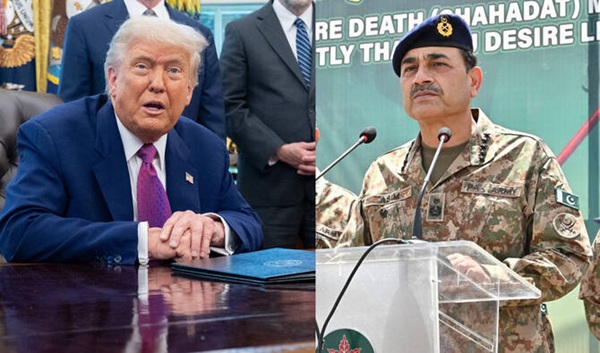In a highly unusual diplomatic moment, US President Donald Trump hosted Pakistan’s Chief of Army Staff, Field Marshal Asim Munir, for a closed-door meeting at the White House amid rising tensions between Israel and Iran. This marked the first time a Pakistani army chief has met with an American president in such an exclusive setting — without any Pakistani civilian officials present.
Joining Munir was Pakistan’s intelligence chief and national security adviser, Lt Gen Asim Malik. On the US side were Secretary of State Marco Rubio and Special Representative for Middle Eastern Affairs Steve Witkoff.
Though initially planned for one hour, the meeting extended over two, suggesting an in-depth and cordial discussion. Pakistan’s military media wing, ISPR, described it as “exploratory,” with talks ranging from Pakistan-India tensions and AI cooperation to Iran-Israel hostilities.
Both sides reportedly stressed the importance of resolving the Iran-Israel conflict. Trump acknowledged Pakistan’s potential value in understanding Iran. The next day, Pakistan’s Foreign Office clarified its stance, strongly condemning Israeli actions and expressing unambiguous support for Iran. However, when asked if Pakistan would offer military support, the spokesperson said no such request had been received and declined to speculate.
Pakistan’s response reflects its longstanding strategic balancing act — morally siding with Iran, diplomatically pushing for peace, but avoiding military entanglements. The country’s own fraught relationship with nuclear-armed India shapes this cautious approach.
The Foreign Office also condemned Israeli strikes on Iran’s nuclear facilities, warning of dangerous precedents that could erode global security norms — a matter of particular concern for nuclear-armed Pakistan.
In a statement Thursday, ISPR described the US-Pakistan engagement as a diplomatic milestone, claiming it achieved more in three days than India had in three decades. However, some critics pointed to the absence of Pakistan’s civilian leadership, calling the optics troubling for a democratic state.
Former minister Dr Shireen Mazari commented: “Any foreign government seeking alliance/support from a democracy normally deals with civilian leadership. Pakistan sends a different message now.”


